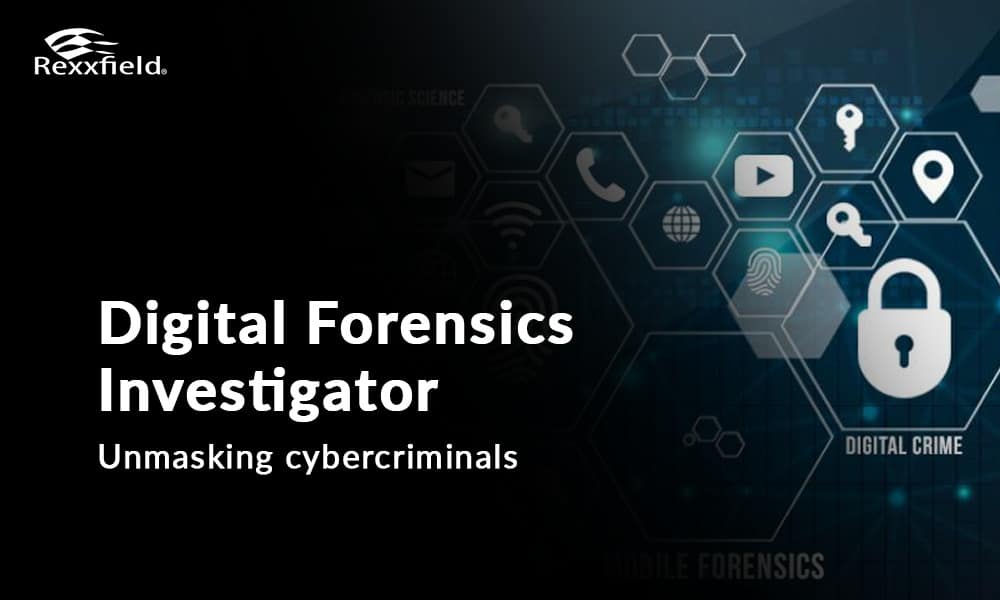Unmasking Cybercriminals: The Role of a Digital Forensics Investigator
As a digital forensics investigator, our company, Rexxfield, specializes in investigating a wide range of crimes such as hacking, identity theft, sextortion, and stalking. Rexxfield’s process involves collecting data from digital devices or media, analysing it to identify relevant evidence, and presenting our findings in a clear and concise manner.
Our goal is to provide relief to our clients by fighting against cybercrime and identifying and prosecuting cybercriminals. Our work has resulted in the apprehension and punishment of many cyber criminals in court.
In addition to digital forensic investigations, we also use digital forensics as a proactive measure by analysing the digital trail left by cyber criminals to weaken their future efforts. This is especially useful in our crypto investigations, where we identify fraudsters, fake profiles, and websites to disrupt their networks.
Rexxfield specializes in resolving online libel issues using a combination of out-of-court solutions and litigation efforts. Our team comprises Certified Digital Forensic Examiners, Computer Forensics, and Electronic Discovery experts, who are among the top authorities on these subjects. Some of our team members have even authored books on the curriculum and examinations used worldwide by government, military, NGO, and corporate clients. We provide invaluable support to plaintiffs seeking equitable and injunctive relief, as well as to defendants seeking a strong defence.
Digital Forensic Investigations

Our digital forensics investigators follow several critical steps to identify cybercriminals:
Preservation of Evidence: The first step is to preserve the evidence to ensure that the data related to the crime is not altered or destroyed. This can be challenging, as some Internet Service Providers delete IP address log files within six months of creation. However, we can bypass these delays by identifying the responsible individuals outside of court, which can save up to 60 to 120 days in delays caused by non-compliance with subpoenas from front-facing websites and ISPs.
Digital Data Analysis: Once the evidence is preserved, a digital forensics investigator uses specialized software to analyse the data. This involves searching for relevant files, associated email addresses, accounts, and other digital artifacts.
Linking Evidence to a Suspect: Investigators use various techniques to link the digital evidence to a suspect. This may involve tracing the source of an email message or tracking the location of an IP address associated with the crime.
Building a Case: After identifying a suspect, a digital forensics investigator uses the collected evidence to build a case against them. This may involve preparing a forensic report detailing the evidence collected and how it supports the case against the suspect. We also testify in court if needed.
How a Digital Forensics Investigator Identifies Anonymous Online Users
As digital forensics investigators, we have specialized skills to identify online anonymous users. Our techniques involve analysing digital data associated with the anonymous user, such as IP addresses, email addresses, and other identifying information. Here are some of the ways we use digital forensics to identify an anonymous user on the internet:
IP Address Tracking:
We commonly track IP addresses to identify an anonymous user. By analysing web server logs, we can determine the IP address associated with a particular user, which can then be used to identify the user’s internet service provider (ISP) and approximate location. However, we also have proprietary tools that allow us to defeat VPN and other cloaking tools that malicious users use to hide their tracks.
Email Header Analysis:
We can analyse email header information to identify the sender’s email address, as well as information about the mail server used to send the message. This information can sometimes be used to identify the anonymous user who sent the email. Though most email providers hide IP addresses, we can still find an originating IP address in some cases.
Social Media Analysis:
Social media platforms often collect a wide range of user data, including IP addresses and other identifying information. We can analyse social media activity associated with the anonymous user to identify their real identity.
Metadata Analysis:
Digital files such as photos and documents often contain metadata, which is information about the file that is stored within the file itself. By analysing this metadata, we may be able to identify the anonymous user who created the file.
It’s important to note that digital forensic investigations require specialized skills and tools, as well as adherence to strict legal and ethical guidelines. We obtain the necessary permissions and warrants before collecting and analysing digital data to ensure that our digital forensic investigations are completely legal and admissible in court.
Our findings are also compelling in court, and we have a proven track record of success in identifying anonymous online users involved in malicious activities.
Rexxfield’s Effective Approach to Electronic Discovery.
Electronic discovery, or e-discovery, is the process of obtaining electronically stored information (ESI) as evidence in legal cases. In cases involving unidentified defendants, known as Doe cases, Rexxfield’s digital forensics investigators use proprietary techniques and carefully crafted subpoenas and court orders to positively identify offenders.
However, ISPs may try to avoid compliance with subpoenas and court orders by exploiting deficient wording in these documents. To mitigate the risk of dismissals due to poor evidence, Rexxfield promptly and cost-effectively prepares documents that effectively address these deficiencies.
Furthermore, some judges may have concerns about issuing production orders for ISPs, fearing potential violations of the First Amendment. Rexxfield can ease these concerns by preparing detailed subpoena addendums that provide a plain language description of the requested records and a clear justification. This satisfies even the most cautious of judges and enables Rexxfield to obtain ex parte orders against major companies like Google for record production in a matter of months, where others have struggled for much longer without success.
Rexxfield’s digital forensics investigators also ensure that technical language in production requests is precise, preventing ISPs from withholding crucial information due to deficient or ambiguous subpoena preparation. This precise language ensures that Rexxfield can obtain the necessary evidence to successfully litigate cases and protect their clients’ interests.
Contact digital forensics investigator


